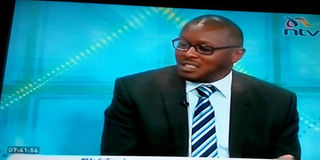Sorry Nkaissery, but arresting journalists is like putting out a fire using a dog’s tail

The Daily Nation's parliamentary Editor John Ngirachu speaks on "Press Pass", an NTV programme on the media, on October 15, 2015. PHOTO | VINCENT NG'ETHE | NATION MEDIA GROUP
What you need to know:
If Kenyatta allowed his relative, Udi Gecaga, to buy the main newspaper in the country, he would lose the respect of those who called him the Burning Spear because of his confidence.
I will never forget the shock, on my first visit to the UK, of reading a survey which indicated that the police force in that country was the most trusted institution.
By contrast, just three weeks ago, a boy in Nairobi whose mother was in the salon wandered out and got lost. Well-wishers brought him to the newsroom rather than to the police station.
Kenyans love to complain about their newspapers.
But that’s a good thing because in many other countries in Africa they simply never read the papers.
The Nation has the highest circulation of any newspaper on the continent outside South Africa partly because of Kenya’s unique history when it comes to the private media.
At independence, nearly all of the new governments in Africa shut down the privately owned press.
HOW AGA KHAN PERSUADED JOMO KENYATTA
Kenya and Senegal were among the few exceptions.
Players in the Jomo Kenyatta government, especially members of the ruling elite who did not like the Nation’s editorial line, tried to force the Aga Khan to sell the paper to them in the 1970s.
Fortunately for Kenya, the Aga Khan displayed a deft hand. He went behind their backs and directly to Mzee Kenyatta.
He played the flattery card, as we learn from Gerry Loughran’s The Birth of a Nation, a rich book which a smart publisher should bring out in soft copy to gain a larger audience.
The Aga Khan told Mzee Kenyatta that he was respected around the world because, unlike others including his fellow giants such as Kwame Nkrumah, he and Leopold Senghor of Senegal were the only ones who were confident enough to tolerate a free press.
PROFESSIONALISM
If Kenyatta allowed his relative, Udi Gecaga, to buy the main newspaper in the country, he would lose the respect of those who called him the Burning Spear because of his confidence.
That sealed the deal. Mzee picked up the phone and called the fellows who were lining up to buy the Nation and told them to drop the plan.
That was an important moment because the fact the media remained in private hands — and the presence of numerous journalists from London’s Fleet Street among the early core of editors at both the Nation and the Standard — meant that the print media in Kenya came to have a degree of professionalism higher than most on the continent.
It’s true the media has its shortcomings which it needs to address. But Kenya is the only country I know of where, for years, in survey after survey, the media has been named as the most trusted institution.
CHECK SOCIETY
That’s not because the media is especially great.
It is a commentary of the dysfunction of many other institutions in the country which means that many are left relying on the press to keep other segments of society in check.
I will never forget the shock, on my first visit to the UK, of reading a survey which indicated that the police force in that country was the most trusted institution.
People at festivals routinely posed for pictures with the officers, who were unarmed and asked them for directions.
By contrast, just three weeks ago, a boy in Nairobi whose mother was in the salon wandered out and got lost. Well-wishers brought him to the newsroom rather than to the police station.
The reporter Stella Cherono took care of the baby and put out messages on social media about him. NTV reported on it. Desperation set in around 9 pm because legally he had to be turned over to a police station for the night.
Fortunately the mother was traced thanks to the TV message and she came over to reclaim him just in time.
MUZZLING THE MEDIA
This context should help explain to Major-General Joseph Nkaissery why trying to muzzle the media in Kenya in this day and age is a waste of time.
The train left the station decades ago.
Even Daniel Moi couldn’t put the genie back into the bottle although he tried.
The likes of Wahome Mutahi, Otieno Mak’Onyango and my former editor Mugo Theuri were jailed, Pius Nyamora was exiled and the photojournalist Wallace Gichere was thrown by the police out of a third-floor apartment and left paralysed for life.
It was all in vain. Wahome Mutahi memorably advised Moi when he temporarily shut down reception of the BBC (which was a popular alternative to state broadcast media) that his efforts would be as futile as those of a dog trying to put out a fire using its tail.
If it was impossible to shut down the media in those days, how does Nkaissery propose to successfully stop reportage of corruption in 2015 again?





